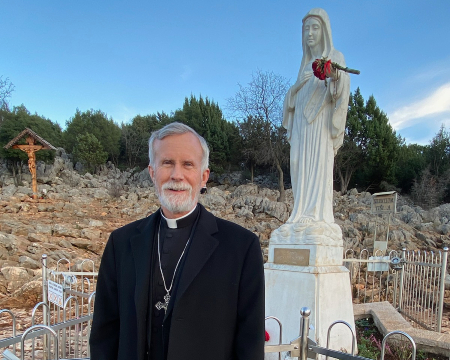We ask you, humbly: don't scroll away.
Hi readers, it seems you use Catholic Online a lot; that's great! It's a little awkward to ask, but we need your help. If you have already donated, we sincerely thank you. We're not salespeople, but we depend on donations averaging $14.76 and fewer than 1% of readers give. If you donate just $5.00, the price of your coffee, Catholic Online School could keep thriving. Thank you.Help Now >
Alain-René Le Sage
FREE Catholic Classes
Writer, b. at Sarzeau (Morbihan), 1668; d. at Boulogne-sur-Mer, 1747. The son of a notary who died early in the youth's career, he left the Jesuit college of Vannes after the completion of his studies, and found himself penniless, his guardian having squandered his fortune. He married at the age of twenty-six and at first practised law, but he relinquished a profession which did not provide him with sufficient means for his needs, and devoted himself to literature. The Abbé de Lyonne settled a small pension upon him and encouraged him to study Spanish literature. Le Sage translated a number of plays from that language, without finding favour in the public eye. But a short original farce in prose, "Crispin rival de son maître", won marked success (1707). Its merits have kept it on the stage. Le Sage was both a dramatist and a novelist, and was a prolific writer of plays and romances. The enmity of the actors forced him, like Piron, to go to the minor theatre of the Foire, for which he collaborated in writing about a hundred plays. Amidst the sorrows and infirmities of age, he still wrote, hurriedly and incessantly, in order to make a living. He resided at the time with one of his sons, a canon at Boulogne-sur-Mer, at which place he died, aged eighty.
We ask you, humbly: don't scroll away.
Hi readers, it seems you use Catholic Online a lot; that's great! It's a little awkward to ask, but we need your help. If you have already donated, we sincerely thank you. We're not salespeople, but we depend on donations averaging $14.76 and fewer than 1% of readers give. If you donate just $5.00, the price of your coffee, Catholic Online School could keep thriving. Thank you.Help Now >
Besides the short farce of "Crispin", three works of Le Sage are worthy of special mention: "Turcaret", "Le Diable Boiteux", and "Gil Blas". "Turcaret ou le Financier" (1709) is a comedy in prose in which the principal character is a financier. This upstart, who has risen by theft and usury, is surrounded by people equally unscrupulous. It is an assemblage of rogues. A coquette shares her favours between Turcaret, who loves her and pays her, and a fashionable cavalier whom she loves. Frontin, the cavalier's valet, sums up the play fairly well when he says to his master: "We pluck a coquette; the coquette ruins a financier; the financier swindles others, which makes the most amusing ricochet of knavish tricks imaginable." The dialogue is spirited, the descriptions are true to life, and the action is full of animation. Perhaps no other play approaches so closely to Molière's great comedies. "Le Diable Boiteux"(1707) is based on a story from the Spanish writer Guevara (1641):The demon Asmodeus removes the roofs of the houses of Madrid, to show to a Castilian student the foibles and vices within the buildings. Aside from this Le Sage finds his inspiration in the Parisian himself; he describes Parisian society with truth and picturesqueness in a series of detached adventures and scenes. The success of the work was great. Le Sage's greatest work, however, was "Histoire de Gil Blas de Santillane" (4 vols., 1715-35). The Spaniards Gil Blas, hero of the romance, is in turn lackey, physician, major-domo of the great lord, secretary to an archbishop, favourite of the prime minister. He is finally given a title and an estate; he marries and peacefully writes his memoirs. The moral of the book is that one must constantly guard against the wiles of hypocrites and impostors. The writer correctly paints, with artful satire, French society as it was in the eighteenth century, and in fact, society in general. In spite of assertion, "Gil Blas" is not plagiarized from a Spanish novel. It is an original work, and in France is considered one of the masterpieces of romance.
 Hi readers, it seems you use Catholic Online a lot; that's great! It's a little awkward to ask, but we need your help. If you have already donated, we sincerely thank you. We're not salespeople, but we depend on donations averaging $14.76 and fewer than 1% of readers give. If you donate just $5.00, the price of your coffee, Catholic Online School could keep thriving. Thank you. Help Now >
Hi readers, it seems you use Catholic Online a lot; that's great! It's a little awkward to ask, but we need your help. If you have already donated, we sincerely thank you. We're not salespeople, but we depend on donations averaging $14.76 and fewer than 1% of readers give. If you donate just $5.00, the price of your coffee, Catholic Online School could keep thriving. Thank you. Help Now >







 Daily Readings for Saturday, April 20, 2024
Daily Readings for Saturday, April 20, 2024 St. Marian: Saint of the Day for Saturday, April 20, 2024
St. Marian: Saint of the Day for Saturday, April 20, 2024 Children's Prayer For Parents: Prayer of the Day for Saturday, April 20, 2024
Children's Prayer For Parents: Prayer of the Day for Saturday, April 20, 2024

